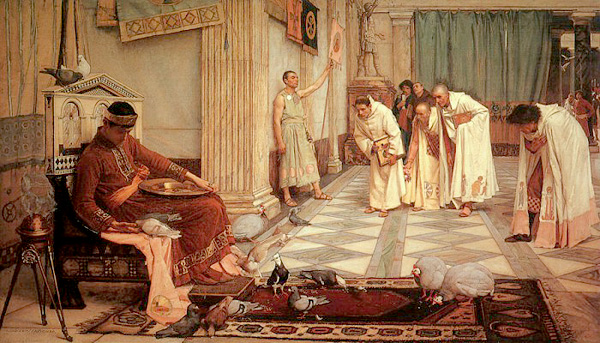
"At that time they say that the Emperor Honorius in Ravenna received the message from one of the eunuchs, evidently a keeper of the poultry, that Rome had perished. And he cried out and said, 'And yet it has just eaten from my hands!' For he had a very large cock, Rome by name; and the eunuch comprehending his words said that it was the city of Rome which had perished at the hands of Alaric, and the emperor with a sigh of relief answered quickly: 'But I, my good fellow, thought that my fowl Rome had perished.' So great, they say, was the folly with which this emperor was possessed."
Procopius, The Vandalic War (III.2.25-26)
This "singular, and, indeed, improbable tale," as Gibbon characterizes it, is scarcely credible, but it does offer evidence of public opinion at the time. In The Favourites of the Emperor Honorius by John William Waterhouse (1883), Honorius feeds his pigeons, indifferent to the news that Rome has fallen. Gibbon presents no less a damning portrait of the emperor, for whom "the amusement of feeding poultry became the serious and daily care of the monarch of the West" and who "passed the slumber of his life, a captive in his palace, a stranger in his country, and the patient, almost the indifferent, spectator of the ruin of the Western empire, which was repeatedly attacked, and finally subverted, by the arms of the Barbarians" (XXIX).
Again, one sees in Waterhouse's composition a single figure in opposition to a group. More subtle features include the impertinent gesture of the attendant in the background, his hand on his hip as he draws back a curtain to the outside world (and the pigeons that flutter there). Too, the ineffectual and timid Honorius, his face in shadow next to the soporific vapors of the brazier, is contrasted to Augustus (the Prima Porta statue) in the background.
In the National Art Gallery of South Australia (Adelaide), the picture was acquired by the gallery while still on view.
When the Visigoths invaded Italy in AD 401, Honorius (AD 393-423) fled Milan and moved the imperial court to the more defensible city of Ravenna. There, surrounded by protective marshes, he abandoned Italy to the barbarians, who, relates Procopius,
"destroyed all the cities which they captured...so completely that nothing has been left to my time to know them by, unless, indeed, it might be one tower or one gate or some such thing which chanced to remain. And they killed all the people, as many as came in their way, both old and young alike, sparing neither women nor children. Wherefore even up to the present time Italy is sparsely populated" (III.11-12).
Indecisive, vacillating between diffidence and defiance, Honorius rejected a demand for land on which to settle and as much grain as the Romans thought fit to offer. "When Alaric made these fair and prudent proposals," says Zosimus (5.51), "everyone marvelled at the man's moderation."
References: Procopius: History of the Wars (Bk III: The Vandalic War) (1916) translated by H. B. Dewing (Loeb Classical Library); Zosimus: New History (1982) translated by Ronald T. Ridley; Edward Gibbon: The History of the Decline and Fall of the Roman Empire (1995) edited by David Womersley (Penguin Classics); J. W. Waterhouse (2002) by Peter Trippi.